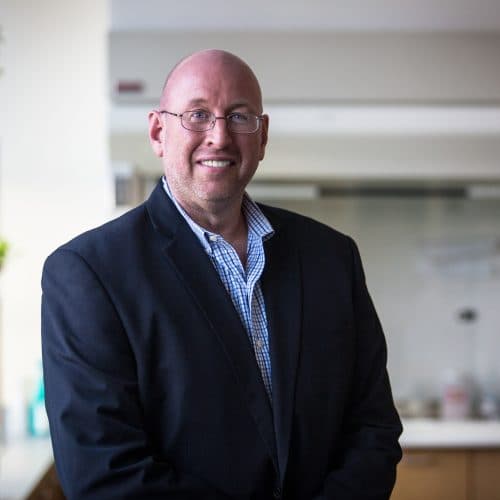PhD
GlaxoSmithKline Distinguished Professorship in Molecular and Chemical Biology
UNC-Asheville
Cancer Cell Biology
Area of Interest
My research goals are to understand the signaling functions of the G12/13 class of trimeric G proteins, specifically the role of their interactions with numerous intracellular effector proteins, and the structural features that arose during evolution of this G protein class to allow engagement of specific pathways. I have worked in this field for 18 years, beginning with my post-doctoral studies with Pat Casey in which we identified one of the earliest binding partners of activated Gα12, the cadherin cytoplasmic tail.
In my position as a biology professor, I strive to be equal parts scientist and educator. UNC Asheville is the public liberal arts institution of the UNC system, and my laboratory is populated exclusively by undergraduate students. One of my everyday challenges is to provide intensive hands-on guidance to students in biological concepts and experimental techniques, while maintaining a relevant, productive, viable research program in a competitive field populated by labs of graduate students and postdocs. I train and guide my undergraduates in a variety of projects to elucidate structural determinants of different G12/13-effector interactions and link these to specific downstream responses in cells. These experiments require students to gain proficiency in PCR-based subcloning, design and execution of targeted mutagenesis, bacterial culture, affinity purification of plasmids and recombinant proteins, mammalian cell culture and transfections, cell fractionation, protein interaction assays, SDS-PAGE and immunoblotting, reporter gene assays, and quantitative and statistical analyses of data.
I recruit many of my students from courses I teach, in which I seek excellent academic performers who also show keen interest in scientific discovery and are reliable, punctual, and enthusiastic about bench work. Projects typically span 12-24 months, and I involve these students in all aspects of the research, from reagent preparation to experimental design. I require them to give oral and written presentations of their work, both on- and off-campus. In a decade at UNC Asheville, I have mentored more than 45 students in my lab, and in 25 instances a student of mine has received co-authorship on a peer-reviewed publication. I have taken six groups of students to national scientific meetings, where these students have presented research posters and, in April 2014, a student received Honorable Mention at the American Society for Biochemistry and Molecular Biology (ASBMB undergraduate poster competition). As my students gain experience, they are increasingly given research goals and laboratory responsibilities more at a graduate school level. I feel one of my most important roles is to provide my students a level of preparation and rigor that will allow them to transition into graduate and professional programs with strong self-reliance, technical skill, knowledge of cell biology, and ability to manage complex problems and experimental systems. Students whom I have mentored in undergraduate research have enrolled in Ph.D. programs at Johns Hopkins Univ., UNC-Chapel Hill, Brandeis, NYU, Univ. of Alberta, Univ. of Ala. Birmingham, and Univ. of California, Berkeley, plus medical schools (UNC-Chapel Hill, Univ. of New Mexico), veterinary schools (NC State Univ., Lincoln Memorial), pharmacy schools (UNC-Chapel Hill and East Tenn. St.), and dental school (UNC-Chapel Hill).

